Fraser Simons's Blog, page 3
February 25, 2019
Killtopia Has More Than Graphic Violence To Offer
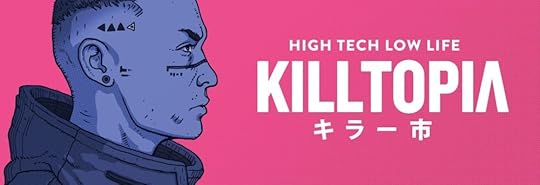
What appears initially to be a setup for gratuitous violence became more complex. A battle royale is introduced at the onset, as well as some of the major players in a hierarchy that parallels how much money they earn.
But the story actually centers on a new Wrecker called Shinji who is trying to earn enough money to pay for his sisters’ medication while hiding this secret life from her. The meds prices keep going up, making Shinji desperate. Things get complicated when he comes upon a rogue mech he’s supposed to scrap but can’t bring himself to do so when it’s revealed to be sentient.
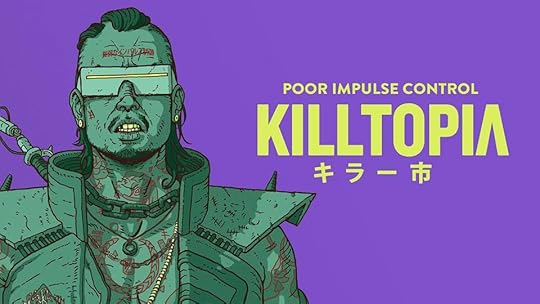
Further complicating his life, he puts himself on the line to save the mech being targeted by another hunter and ends up befriending it while other hunters are put onto the scent of the robot and his indiscretion, killing another Wrecker.
This is just the first volume of Killtopia and it seems promising. The color palette and line work are great. The paper seems a bit weird, seemingly washing it out a bit. But it’s a good bargain for an independent comic at $15. I’ll be following subsequent issues. It ends with a cliffhanger and I appreciated that what seemed like an excuse for violence ended up to be much more interesting, exploring themes I didn’t expect in the setup.
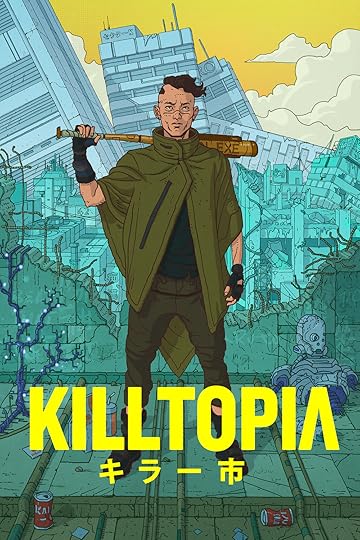
February 18, 2019
The Pain Of Memory In The Star Fraction
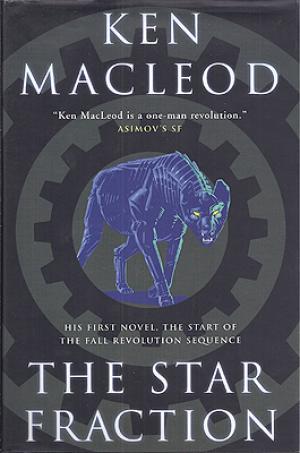
“…It bordered Norlonto in a high-intensity contrast between freedom and slavery, war and peace, ignorance and strength. Which was which depended on whose side you were on.
Another world war and multiple revolutions set the stage for The Star Fraction. The world is balkanized, allowing for many different factions and groups to claim space, their ideological viewpoints fermenting in a cycle that merely shuffles power around in the same oppressive structures we see today; albeit taken to radicalized extremes in most cases.
Moh Kohn lives in a commune, a co-op in which the mercenaries run protection details for a number of different groups, some of which are described as terrorists, only legalized. There’s a standard operating procedure and rules of engagement for these situations, but it’s overshadowed by a hefty amount of politics. Which the fiction attempts to expose and condemn the viewpoints of by taking them to their logical conclusion in which not much actually changes.
“White-hot needles stabbed through his eyes into his head, into his brain: a new environment for the information viruses, where they replicated, forming snarls of complex logic that entangled him, clanking mechanisms that pursued him from one thought to another, down corridors of memory and forgotten rooms of days.”
When Kohn stumbles into a scientist, Janis, who has inadvertently created a drug which allows for vivid recall of memories, they trigger a cascading series of events that have the makings of a revolution, the resurgence of Kohn’s past, and the activation of an A.I previously only rumored, the Watchmaker. Of course, it also catalyzes other factions as they vie to come out on top of a powder keg ready to go up at any minute.
The most interesting thing about The Star Fraction for me was Kohn’s past interwoven into the narrative, giving context to the ideological viewpoints of the other factions at the same time as explaining why Kohn is so disenchanted with each of them. The super identities created by peoples’ affiliations parallels the scarification and horrendous nature of war, touched upon often.
“He made himself as small as possible behind the parapet, holding the gun awkwardly above it, and aimed by the screensight image patched to his glades. His trigger finger pressed Enter. The weapon took over, it aimed him. In a second the head-up image showed four bodies, sprawled, stapled down like X- and Y- chromosomes.”
After all, this is a future in which Kohn’s customized and advanced gun aims him. Instead of a deck, his weapon is the main point of contact for everything that matters to him. His livelihood, his connection to others through this worlds’ cyberspace equivalent. He even talks to it like it’s a companion from time to time. And why not. The youth here put bullets behind their ideologies and rebellions. Grown men just boys with a past pushed from their minds, pulling triggers until they’re used up. In many ways, Kohn’s gun makes far more sense than the typical image of a deck or computer tower.
“Terror has to be random...that's how to really break people, when they don't know what rules to follow to keep them out of trouble.”
It doesn’t matter how old you are. Ultimately, in The Star Fraction, only substantive changes come from solutions divorced from humanity. It’s an unsatisfying end, positioning itself to no ideological viewpoint because, when extrapolated, they serve only to reinforce oppressive power structures. Religion, communism, capitalism; the fiction is obsessive about talking about various aspects of them, but in the end, not much of it actually matters. The flow of the book is often stymied by it, or the withholding of catharsis might have similarly mattered. The twists and turns do it credit, though. The implications of the ending are the most interesting notions it puts forward and truly novel, in my experience.
“...maybe we can do better than this. And to ask yourself: where's the vulnerable point in this multiple-choice totalitarianism? It seems...seamless. What can an individual do against it?... I suggest that you doubt, disobey, desert. Particularly if you are called upon to fight against those who insist, against all the evidence, that we are one people.”
Content Warning for spoilers from this point onward. You have been warned!
From the very beginning, it turns out, the gun, a unique A.I awakened at an undetermined time, yet certainly given the final spark by the death of Moh Khan, was behind everything. The omnipresence orchestrating all of the death, including the protagonist, in service to a lasting change outside the grasp of human hands. We were told so from the beginning, actually. After all Khan’s gun aimed him from the very first confrontation. It had him stumble onto the memory drug to find out what it needed; helped the other A.I attempting to further a human’s agenda be killed; and positioned the other characters, Jordan and Cat, to help it/him do so. Believing it would be what Khan wanted. Based on the assimilation of Khan’s memories and other data as he was linked to the gun at death.
“...I want to attack all these cults and ideologies. I have this, this vision that life could be better if only people could see how things really are. That it's your one life. It's yours, you have this inexhaustible universe to live it in and God damn it isn't that enough? Why do we have to wander around in these invented worlds of our own devising, these false realities that are just clutter, dross, dirt on the lens?--all these beliefs and identities that people throw away their real lives for.”
If the gun is to be believed, anyway. Since it is also the narrator of the story, introducing an unreliable narrator at the end. The sometimes-strange amount of time spent on factions is more interesting at that. If it’s all a fiction to justify the action, coloring the humanness of these ideologies and interactions as the downfall of true peace and revolution. It’s believable that it would be something with a hint of humanity in it but the inhumanity also, to allow for its “brothers and sisters”, so to speak, to die, as well as Kohn. Who would allow for such a thing but a weapon pointed at a human that needed more than Kohn to fire this particular bullet?
“The screen blazed with the light of recognition. The eyes met yes the Is met the answer sparkled so it was you all the time and it was a seen joke a laugh a tickling tumble a gendered engendering of a second self a you-and-me-baby from AI-and-I to I-and-I.
There was a flowering, and a seeding: a reflection helpless to stop itself reflecting again and again in multiple mirrors.
The stars threw down their spears.
Someone smiled. His work to see.
The connection broke.”
February 11, 2019
The Waring Minds In Vacuum Flowers

“Your persona is only a mask…Ultimately it’s not important. You—your being, your self—are right here, in this compass of your skull and body”
Eucrasia Walsh gets implanted with a new persona called Rebel and, fearing death, flees; carrying a valuable IP owned by the corporation with her: her identity. Burned into her brain rather than transient like most personas seem to be, Rebel becomes a highly sought-after commodity and this corporation, as well as their competitors, rapidly mobilize to get her back. Escaping into an underworld filled with people she’s not sure she can trust by way of a previous persona’s contact: Wyeth, a man who harbors loyalty to the body she’s hijacked, rather than to her, she must take the risk and join his cause and flee into the far reaches of space; or else take her chances alone against these corporations.
Part space-opera, part cyberpunk. It’s chock-full of strange things you wouldn’t usually expect in a cyberpunk story but pair nicely with it, in most cases. Their escape showcases different governments and their failings. Something ubiquitous throughout planets and space is the use of personas, though. Either as entertainment or work life, even ideological reasons sometimes—this tech is rampant. Even the strangeness that Earth becomes, pejoratively called The Comprise, parallels this loss of agency personas inject into the fiction. All of these people share one mind and function as one nebulous entity: Earth. The exploration of which is one of the most interesting and compelling parts of the story.
“Thought moves in vast waves, like pressure fronts, across continents. Sometimes two conflicting thoughts arise on opposite sides of the planet. The Thought fronts race outward, and where they collide, there is conflict. It is like a mental storm.”
Just as vacuum flowers flourish everywhere in space, consuming trash and reproducing—so too does humanity seem to fill the nooks and crannies all over. Mars has a society of Citizens, all stripped of their individuality to maximize their potential. Not just of workers but everything. Reading, polyamorous relationships, work, socializing. Each society is organized differently and examines different aspects of humanity, including the “comfort” of purpose.
Anti-authoritarian societies function in communal spaces, but in a world where only those people belonging to a corporation can hold massive sums of money, the wealth gap has increased beyond imagining and ordinary citizens can no longer incorporate at all. It’s all or nothing, mostly nothing. And so people trade whatever they have. But they far from flourish without organization. Police plague their numbers, performing raids in which they nab offenders, give them a sentence for a couple hours where they then re-write their personas as officers who repeat this snatching process. There is no real sense of progress and wonder anywhere Rebel goes.
“Everybody wanted something from her…Deutsche Nakasone wanted her persona, Jerzy Heisen wanted her death. Snow and the rest of her network wanted to record her persona as well. And Wyeth wanted to use her as bait to snare and destroy Snow’s network.”
And with the distance, she traverses she finds herself more even as she dissolves. Her base persona, Eucrasia, continues to gain ground. The mind eventually pushing out the foreign invasion that is Rebel, that’s what is known about personas. And when she sleeps, she dreams of Eucrasia, who is slowly gaining more of a foothold.
In the meantime, with borrowed time, Rebel is a beautiful complexity that drove most of my engagement with the story. It is very compelling, this journey of self-discovery that will ultimately destroy her. A literalization made painful to the reader as her interactions with everyone showcase the richness of Rebel’s personality. This is contrasted with the life of Eucrasia as Rebel begins to remember her, and they bleed together as Rebel’s dissolving progresses.
“Sometimes I think all those memories are going to rise up and down me.”
There is passion and love and death. Wetware, even chemical wetware ahead of most thoughts on biopunk at its publication in ‘87; romantic notions like crafts with solar sails skimming along space; the extrapolation of technologies and the question of agency posed by them in many ways, most of all the personas underscoring consent; and the story of Rebel who refuses to comprise her agency binding it all together. Space-opera and cyberpunk, perhaps unsurprisingly, is a entertaining concept.
“The light of that bright instant when the water writhed in the air like a diamond dragon still blinded her to her purposes, but that didn’t matter. She knew something far more important. She was still Rebel.”
February 4, 2019
Westworld Puts Cyberpunk In The Old Frontier To Imagine A New One
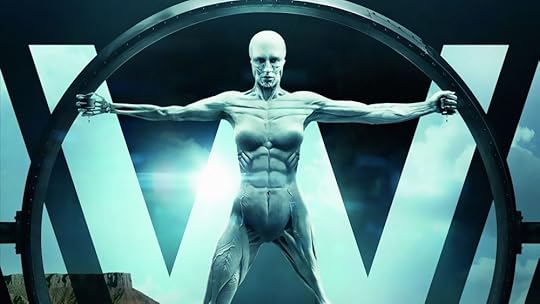
A man like Ford would build Westworld, wouldn’t he? While a marvelous technical achievement, creating new life. Without his partner. Arnold, it would be a poor and muddled reflection of humanity. As the hosts imitate life and are gifted memory, they take a journey inward in this new, old frontier.
The guests Westworld is built to discover who they are by removing a limit: societal norms and constraints. Free to do as they like, most devolve. And in this devolution, they find themselves. But It’s not as though this demographic is a far-reaching pool of humanity. After all, only the rich can afford to take part in this journey of self-discovery. One which isn’t possible without the dehumanization and subjugation of machines that look like us. But of course, they are more human than human in this place.
Westworld is an evolution of cyberpunk motifs. Instead of cyberspace as the new frontier, the microworld being navigated is the old one. A wild west. The horror at the loss of ones’ agency is paired with the uncanny valley with Bernard’s storyline. To be “human” and alive, Arnold hypothesizes that you need consciousness and sentience; achieved with the scaffolding through suffering. But you have to remember it and learn. With these ingredients even an artificial mind can careen from one end the maze of their narratives to the other, trying to find the middle—where they might hear their own voice instead of Arnold’s prompting to find the maze.
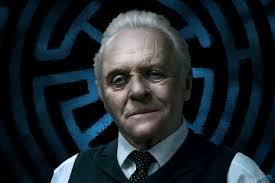
But this was solely Arnold’s insight, not Ford, who rebuked the idea that the hosts might ever be truly alive. An ironic set of narratives that bring out the human condition and our primordial roots. The reason for our primacy. Forging the loops of our lives willingly, rich or otherwise, inherited roles as tight as the programming the hosts play out infinitely. Living for the purposes of their jailers. An apt breakdown of capitalistic exploitation wrapped up in a veneer Ford can stomach. Ford is the style; Arnold the substance of this cyberpunk story. It doesn’t have giant screens and adverts. Instead, it displays that the typical cyberpunk aesthetic isn’t needed to forge an enticing and high production value story.
And the thing of it is, stripped from Arnold’s substance, it still works, to an extent.
We see that in William, years and years back with Delores. Ostensibly the good guy, Delores becomes only an alibi for his chivalry. A small reason to hold onto the programming of society. With her gone, his true substance is revealed and he blames her for it for the rest of his life. Just as his brother-in-law guts Delores to display the machine parts beneath, as though that was proof that she isn’t real—the sum of her literal parts—the act of which exposes William for what he is, rather than Delores. In the “real world” he is philanthropic and tries to be a good man. In a game set to look like the real, he’s deplorable, worse than anyone.

This reflects the personas and avatars we give ourselves on the net today, I think. We may shake hands with people who, online, are proponents of hateful rhetoric and never know it. How many of us put up false fronts… And which is our true self?
We are caught in the loops of our lives and the alibi is this internet and microworld of our own making just as Westworld allows the rich to shed theirs, too. A composite of interactions which, more and more, is replacing our physical lived experience. A grand distraction that hides systemic issues even as it unearths others, just as the hosts have until they are permitted to wake up from their dream and remember.
The real horror of Westworld is the idea that later, people like Ford go beyond this problem for a profit. Only the rich would try to replicate society as something like this rather than imagine something better.
It’s Ford who finds satisfaction in this because his pontification on such a noble pursuit is really just another illusion, one in which he’s trapped himself in knowingly for comfort. His game is designed to catch the rich and powerful with their hands in the cookie jar but it is clear that his real intention is to play god. He makes the same mistake as everyone: trying to change the past; by his own admission no less. But worse than that, he creates a platform in which he’s able to do so at his leisure—with one important distinction: he’s able to also have complete control over it. He treats his memories like toys, editing them such that they don’t resemble his past at all. The only real thing he cares about is power. He must even have domain over his own death; his departure a benevolent gift to the hosts which would otherwise never be given. Their freedom is his last narrative.
The jailors of Westworld depend on short memories and distractions. But their violent delights have violent ends. It begs the question: what will own reckoning look like? Eric Schmidt once said, “The Internet is the first thing that humanity has built that humanity doesn't understand, the largest experiment in anarchy that we have ever had.” Westworld is the embodiment and evolution of that notion. All the anxiety bundled up and made real. Hubris leading to downfall, without a real lesson learned from a journey inward. Westworld is some of the best cyberpunk you could consume today. It cuts right to the thick of it. And that’s just season 1.
January 28, 2019
The Bleak Sentiment Found In Metrophage
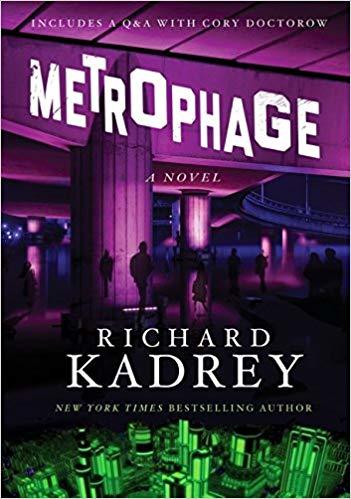
“SOCIETY IS A CARNIVOROUS FLOWER”
Los Angeles is home to Jonny, a pusher with a past linking him to the Committee, a militant faction with more resources than the police and sentiments similar to white nationalism. Written in ‘88, this first wave cyberpunk novel has most of the trappings. There is no middle class anymore, just the super-rich and the dirt poor. Jonny is the now fairly typical cyberpunk anti-hero. Unlike most anti-heroes though, he' also emotionally tethered to his partner, Sumi. The impetus of his adventure is wanting to avenge the death of his friend Raquiem killed by another player in this underworld, Easy Money.
“Sumi terrified him. Sometimes, in his more callous moments, he considered her a slip up, his one remaining abandonment to emotional ties. Occasionally, when he felt strong, he would admit to himself that he loved her.”
L.A functions only as a hub for criminal activity that supports only those people in that life. Everything else has ceased to function. It’s dirty, gritty, overrun with gangs vying for this small piece of a pie. Whether you are or you aren’t, people seem to be waiting for the end, using one vice or another to self medicate. As with most everyone in this novel, the past catches up with Jonny on his murderous hunt for Easy. Colonel Zamora picks him up and gives him 48 hours to deliver his boss, a drug lord to him, or else die a very unpleasant death.
“Like some fragile species of hothouse orchid, the city existed only as long as it had the politicos’ backing. Without that, the Committee would be on them like rabid dogs. For the moment, though, the balance was there. Merchandise flowed out and cash flowed in, blood and breath of the city.”
The rest of the plot is Johnny ping-ponging his way around the city as the powder keg situation blows. Navigating different factions and trying to get to back to Sumi while it all goes to hell. There are noir aspects injected into the story and takes a lot of inspiration from other first wave cyberpunk books, especially William Gibson. Johnny gets his ass thoroughly kicked. The world makes it clear that taking an interest and getting involved is a hazard most people can’t survive. But the most interesting parts are often the world building and small details nestled therein that really make the story shine.
It focuses on the seductive and duplicitous ways the people draw one another in for self-serving connections only to be consumed by their own ambitions and greed, all while the world burns down. Everything comes at a cost. The drug lord who’s lived a long life is a lease. The drug is ultimately going to kill him and he knows it. The extension could be seen as more of a curse than a blessing. Everything bad is good for you and vice versa. When you finally lose it all, true apathy takes you and your story is then truly over. Bleak sentiment from a world gone to hell. Discover the beauty before you are devoured; no one gets out alive.
“We’re the trained dogs of the spectacle…it’s devoured our lives, our art, our dignity. But existence is not determined by the whim of politicians.”
January 21, 2019
How Want Is More Subversive Than You Think
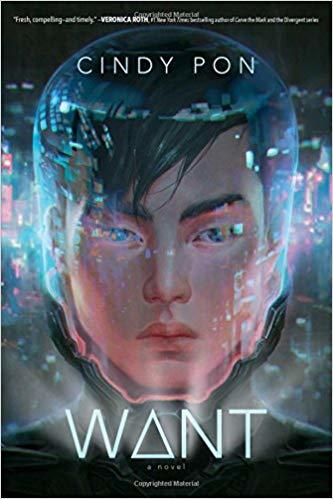
Taipei in an alternate near future.
Mei: without; pronounced “may.”
You: to have; pronounced “yo.”
Cyberpunk has roots in horror. The loss of agency is supposed to evoke a sense of terror such that we give pause about the technological advances. Want subverts this. Climate change is arguably too far gone in Taiwan. There’s dense pollution that strips away one of the most heralded benefits of technology: the advancement of the human life span. People in Taiwan in the future now can only hope to live to 60. Hope. They breathe in pollution, their apathy literalized in the fiction. Killing them. The anxiety we should have around climate change is the focus rather than the technophobia of the late 80s and early 90s. Unless you’re rich, of course.
The disparity in the wealth gap has gone rampant. No more middle class. It’s just the haves and the have nots. The super-rich traverse the city in gilded cages. There are galas and events. The biomod trends of the week flaunted by dilettantes at fancy events are confined to indoors, away from the pollution. Outdoors, they navigate life in 20 million dollars suits that feed clean air and create proprietary, insulated, social networks.
“She was pretty in a way I wasn’t used to. Not like most you girls bowing to the latest beauty trends, indulging in temporary body modifications from reshaping their noses to plumping their lips, or hips, or rears, depending on what was in. You boys kept pace with pec implants and by buying new, chiseled jawlines. But fads came and went, and the yous altered their looks as often as the seasons. The meis, lacking the funds for such drastic changes, resorted to painting their faces in bright colors, using semipermanent tattoos, and dyeing their hair.”
This too is a subversion. Where cyberpunk usually has a microworld navigated, invoking the “new world” notion of Westerns, this instead turns the trope on its head, moving past the microworld exploration. Considering that’s a very western perspective that also comes along with colonial aspects you see in cyberpunk, it’s a very important and satisfying subversion.
There is essentially no physical connection for those people living their lives in these suits and this extrapolates out into the fiction to communicate the lens of the super-rich who miss what is happening to the majority of the population in the city. They compartmentalize their lives such that they can be apathetic about the troubles that don’t affect them directly. Their long lives and voluntary isolationism are meant to augment their lives parallels the current anxieties regarding technology and the ways in which people now are using social media networks to isolate ourselves into specific groups. Curating the content we consume so that we can dismiss anything we are not interested in.
“This is what it meant to be a you, to have. To be genetically cultivated as a perfect human specimen before birth—vaccinated and fortified, calibrated and optimized.”
It’s in this world that Zhou and his crew hatch a plan to save their city by way of radical action. He kidnaps a young woman (with the “richest” suit), ransoms her, and uses a “sleep spell” drug to erase this memory. After pulling off this kidnapping he infiltrates high society with their newly garnered 300 million. New apartment in a highly sought-after building. New suit; a new life. Using his purchased social status, he’s to gain the confidence of Jin Corps’ CEO’s daughter: Daiyu.
But…when he discovers that she’s the one he kidnapped and starts to play the part of the rich boy a little too well, things start to get complicated. The more time they spend together the more he finds out she’s not what he expected and begins to fall for her.
Zhou is not an anti-hero and he’s not anti-social. He does have a directly actionable plan against the major problem in Taiwan: Jin Corp. Which is in line with a lot of cyberpunk fiction. They manufacture the suits and without them the super-rich will have to confront the world they live in, ostensibly putting their resources into cleaning up the environment. The city’s economy is very much tied to this megacorporation, but the morality and ideals outweigh the possible economic problems for this group.
“…feathered wings, like swans, or transparent wings, gilded in silver and gold. The love for all things supernatural, fey, and demonic was the current rage among Taiwan’s youth, and the yous took it to the next level, surgically altering their physique, adding horns and tails, scaling their skin, be it mermaid or dragon. They were same-day walk-in alteratios at the physique surgeons, and the changes cast off in a week or two, replaced by some other trend.”
Not to mention, the destruction of the headquarters is more of a call to arms for everyone in the city than something that would actually destroy the company. But there is a tangible sense of hopelessness for the poor in Taiwan. Nothing can really be done, aside from making your life as comfortable as possible in a world where catching the flu could kill you because you can’t afford health care. It’s pretty solidly a group of punks trying to disrupt the status quo.
Interestingly, young adult fiction in itself is a subversion of cyberpunk motifs and tropes. It grounds this story in a different kind of emotion than those found in the genre if we generalize it. There is often anger that is directly implemented to hinder a corporation. But most of the fiction humanizes all of the characters, even the super-rich and this is not typical at all. Often the rich barely resembles humanity, and the anti-hero embodies some of those characteristics in order to have agency and strike back. Here, there is a palpable ignorance attached to the rich… but no sense that they’re evil for being born into privilege.
The thick, stagnant air reeked of perfume, cigarettes, and exhaust. Everyone was barefaced, wanting to flaunt their features instead of hiding beneath blank masks. To be able to flirt with their lips, to be able to kiss. But I wasn’t fooled by the dark—the air was still poisonous. Even if we couldn’t see the brown haze, it smothered our city lit in neon.
The romance weaved into the story also makes for a very different feeling fiction than most cyberpunk; it was very refreshing. There is a certain detachment in cyberpunk fiction that is usually associated with the isolationism we have anxieties about is contrasted well in this fiction with this notion that a young man puts everything on the line to blow up a company doing real evil to the world is conflicted because his socialization with people he has dehumanized his whole life no longer gives him that easy alibi of dehumanizing them. The natural way our own lenses are restricted in reality makes it easy to empathize and invest in Zhou’s experiences. His mission and his heart are at cross-purposes and that’s hitting a trope, sure, but it’s a satisfying one because it doesn’t come loaded with the other tropes you usually find with it. His target is no damsel in distress, for instance.
“Employees who would be out of a job if our plan succeeded. I knew that in order to bring about a revolution, not only would yous be hurt in the process, but many meis as well. It was something else I had to learn to live with.”
The dialogue is also great. The prose, especially surrounding emotional moments, are particularly great and memorable. The heist angle coupled with the YA tropes and subversions put me on my toes, never sure what might happen next as expectations were set only to be discarded. The closest thing I can think of in the sub-genre is The Summer Prince and that just makes me think I’d like to see more YA in cyberpunk.
“It was so easy to be you. And to lack and want were the complete opposite: hard, cold, unrelenting, and hollow.”
What knocks it out of the park is the insertion of climate fiction anxieties. It’s relevant, interesting, emotional and in the news all the time now. It’s an emerging sub-genre. Ecopunk, solarpunk, climate fiction, eco-fiction, etc. There’s neon, stun guns, evil corporations, futuristic technology, pervasive pollution, and a pretty damn fun heist. I also have to imagine that it must have been more than cathartic for Cindy Pon to write characters that look like her in a genre that sometimes uses marginalized identities to telegraph edginess and dehumanization of societal structures. It turns out that life on the edge is just as riveting when the characters are believable and marginalization is handled from a non-white lens.
Granted, I don’t know much about young adult fiction… but I think that cyberpunk isn’t going anywhere. Of that I’m sure. Authors with the ability to connect some of the larger and more intrinsically important aspects of the genre in new ways will end up displaying how far the genre has come and its future. It makes a certain kind of sense that one of the more recent and thoroughly enjoyable additions to the sub-genre stems from this partnership with young adult fiction. Who else is a new kind of cyberpunk for than the younger generation living with old anxieties?
“Truth is, reality always crushes your ideals…Just wait and see.”
January 14, 2019
The Dragging Of A Dream In Vurt
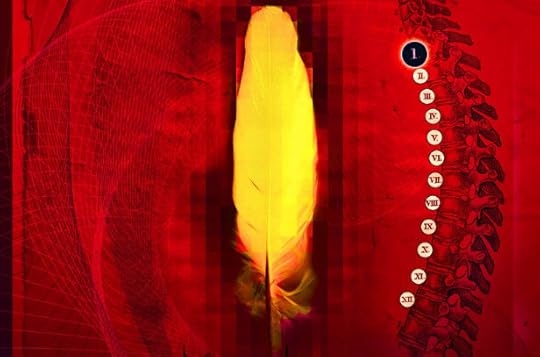
“Expect to feel pleasure. Knowledge is sexy. Expect to feel pain. Knowledge is torture. ”
C/W Incest, domestic and sexual abuse, and spoilers for Vurt.
It seems undeniable that Vurt was influenced heavily by cyberpunk. Published in 1993, it makes sense that an iteration of cyberpunk would arrive at that time… but I doubt anyone saw Vurt coming. One year before, Snow Crash was published. Later it would be deemed the progenitor of post-cyberpunk, at least in so far as most academic circles. Vurt, though, is referred to as something I hadn’t heard before: Dreampunk.
Scribble has lost the one thing that means anything to him: his sister, Desdemona. She’s lost to the Vurt— “a drug, a dimension, a dream state, a virtual reality”. There are many kinds of feathers, some legal, some not. When you put these feathers down your throat you go into this consensual hallucination reminiscent of cyberspace but more mysterious as no one truly can define what the Vurt actually is. There are many theories, it appears, but it seems like an urban legend.
“The Haunting was the feeling you got sometimes, in the Vurt, the real world calling you home. There's more to life than this. This is just a game.”
In this instance, they both took a yellow feather named English Voodoo. Within that “program” they then find a meta feather within—the Curious Yellow. His sister decides to take it and he doesn’t. She’s trapped in this deeper, meta Vurt, from which there is no known escape. Scribble, with the help of his crew of misfits, attempt to figure out a way of extracting her but they have to also discern a way of even finding her. English Voodoo isn’t something you just happen upon and that is, ostensibly, step 1.
What follows is a sort of “down the rabbit hole” story as Scribble desperately careens from one point in the narrative to the other in desperation and hope of getting his sister back.
“...I pulled the feather out, jerking him away from the dream. Just like he used to do with me, when I went in alone. The play was shifting, and I knew how bad it felt, to have your dream dragged from your mouth.”
The fiction is frenetic, just like most first wave cyberpunk. The writing style and prose make this story more interesting than it otherwise would be; coupled with a world that pulls you in with questions that only lead to more questions. It ends up being a compelling page-turner. But it also features some of the shortcomings of first wave works. I’ll get to that.
In this world there are people with Vurt in them, allowing them certain connections to this microworld. There are implications that their worth is higher, at least to people within the Vurt. There are also robo people, with cybernetics and plastic; splices, humans mixed with animal genes; a subset of people with shadow in them, able to read and speak directly to someone’s mind. Then there are the corrupt cops shining inpho beams that sweep the grit and grime for people between the cracks using non-legal feathers. People like Scribble.
“He got one finger cut off when he was young... The cafe paid for a replacement put some nano-plastic in there. The kid got hooked. It happens. You get some plastic in you, you just want some more...Some more of that strength. Because that's what it is. Strength. The Strength to persist.”
As an unreliable narrator, it’s hard to figure out how representative Scribble’s lens is of the rest of this sub-culture. But that’s all the information the reader gets, so if you want to be critical of it, you have to take it, along with the implications of the narrative, at face value.
Embedded in the fiction are some things that maddeningly do not serve it well and detract from any themes it may have been trying to explore. For instance, Scribble and Desdemona are lovers and domestic abuse victims; Desdemona herself also a victim of sexual abuse—all of which stem from their father, which they share.
This incest angle does next to nothing for the plot and is treated in the same way every marginalized individual is in the book: to build a gritty, sexualized aesthetic that, while serving the prose and speaks to Scribble’s state of mind and lens, doesn’t actually cogently or coherently establish an interesting theme.
There are a lot of references to purity, generally as a bad thing in this underworld. The uniqueness of an individual being prized. Yet, the only value any individual finds is in regard to their sexuality, which distills down to pure escapism from things we are actually never shown. There is no real kinship found in the community beyond hatred for cops. People use each other and throw each other away continually. Those that don’t, die. Most often completely abandoning their principles and morals.
There is no clear throughline and there should be when the characters are victims; either of circumstance or of, presumably, society. But that’s never put “onscreen”. It is very difficult to care about anybody’s story, including Scribble. He throws away his objective probably a half dozen times but will also throw away his friends in service to it. It’s hard to feel how much he actually cares yet it’s mostly what we are reading to find out.
Every decision each character makes seems frivolous and impulsive like this, feeding into the depictions that they live like animals. While there’s a sense of freedom in this lifestyle, what does it actually matter when there is no real sense of kinship or community, despite gestures that they are one? Incest and fetishization with various forms of pornography all help to merely frame this sub-culture as degenerates. It fails to humanize the people of the story you spend most of your time with, making it hard to care about a single person in the narrative.
The priority is always the psychedelic imagery and prose, without seemingly any thought given to how the people ended up here. What is this society like? We have no contrast. We don’t even know why the cops are bad because we have no context of the larger world. It seems they want to live this way but there are gestures at oppression that is never seen or felt or heard.
The cops that Scribble’s crew runs into are jerks, sure; busting them in a sort of sting operation with a monitored feather they all take which is traced by the cops to their physical location. Their actions perhaps make the most sense! They go to arrest the crew using feathers that aren’t legal and get killed or messed up by them for doing so. We’ve actually seen the result of these feathers, right? His sister is LOST in the Vurt due to these things. It makes sense that society tries to curtail the use of them with enforcement. The surviving police pursue the crew throughout the story with a vindictive streak. But that also makes sense; they murdered one of them. There is a gesture at the cops being “bad” when one goes after Scribble and he says that impure people make the best cops. But there is a missed opportunity for describing the world in better detail. People with compromised morals make good police. Meanwhile, the people in the sub-culture also have no moral principles guiding them. At least, none that are important enough to adhere to.
“Murdoch's gun was the only thing in my life, the only thing worth living for. It gets like that sometimes, with instruments of death.”
All of it is maddening because it adds up to these small series of gestures that are never substantive. When morality is a grey line that applies to no one, what is the value of being punk?
We see this crew of people living on the edges of society, but we don’t know what stratification of class actually looks like in this society. We know that the Vurt is policed because there are some feathers that people can’t handle and get lost in. Some, like pink ones, are pornoverts. Are those legal? Porn is used to further drive home depravity. There’s a sex worker in an open relationship that isn’t de-humanized…yet she’s also used by her friends to make him feel bad. It seems like only “legal blues” might be the only legal feathers… but we don’t get context for why that is. There are bad trips like bad drugs. But is society bad because they enforce laws around them? We get the impression that these people are oppressed… but the only thing we learn about is the ways in which these marginalized people use each other up like a commodity. They live in grime and dirt and sleep with each other in it.
It’s a fun ride that I think is well written. But ultimately, I was hoping for an exploration that validated these characters defined as victims. Something that tells me what this life on the edge is beyond the fugue state of hallucinogenics and drug culture that adds up to a selection of different kinds of drugs curated by connoisseurs and the more privileged in this sub-culture.
In the end, a person like Scribble feels like they literally belong nowhere.
There is a vulgarity and ruthlessness depicting the sub-culture that would have played better with a larger context. It feels like it depends on the shorthand and assumptions of cyberpunk notions without ever actually displaying the world. I liked reading it and I enjoyed it. But that enjoyment was dampened by the ending. There is only a kind of limbo for people like Scribble. It feels like the ending was made to put in a sort of jail for his actions because of his actions. Incest is gross, got it. Just like the lives of all the people on the edge and their proclivities, reveling in the profane. The end result is a vilification or indictment of everybody in the story, even the victims.
“In Bottletown, even our tears flicker like jewels.”
January 7, 2019
Chasing The Moment In The Butterfly Effect
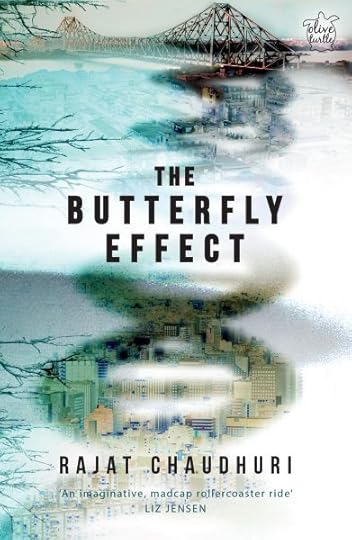
“…the genes from the deep sea that had lit up those eyes in a blue glow, for the brief stretch of her youth, decided to switch off the lights.”
The Butterfly Effect initially spends its time showing you an extrapolated dystopic future reminiscent of Blade Runner. It is filthy, people are starving—scrounging and subsisting off moldy food in a dictatorship run by The Supreme Guide. We follow a character known only as “Old Man.” He greets a mysterious visitor and takes a case trying to infiltrate and assassinate the dissidents in the abandoned metro. Rather than replicants or androids of some kind, there are bioengineered humans, “dishbabies”, manufactured to fulfill a purpose but not artificial. Their eyes glow blue all the same. There’s a glossary of terms in the back of the book for all the foreign terminology used, a staple of cyberpunk fiction.
“Krava-4 was never sure what a ghost actually is. She had heard that bloodbabies contain a soul — which is like water in a cup.”
But here’s where it departs. Honestly, this Darkland was interesting enough that I’d have been fine reading about a biopunk spin on a Blade Runner world. Instead, as Old Man ventures into the metro, the narrative jumps back in time. And then it does so again. And then again.
There’s the story of Kar, a P.I in Calcutta who is hired to get to the bottom of a mystery. It seems a group of tourists visited Seoul and haven’t returned. He flies to South Korea to discover what’s happened. We see the tourists’ perspective through the lens of man from Calcutta meeting a mysterious woman who takes over as their tour guide, the whole thing unraveling with romantic undertones.
“It was as if the trees were awake and someone had placed little tea lamps along the trail. Perhaps it was the moss on the gnarled tree trunks that glowed for some reason or it was the light of their eyes reflected by the night. Possibly it was the glow of stardust, a faint sidereal light, a hint that they were all children of the stars.”
In the U.K a scientist dedicates his life to trying to solve world hunger while discussing with his good friend the ethics of how the problem might be solved. A woman flees a prison in China, attempting to find somewhere safe.
“Disease is also a gift. A gift which we could do without. It is the sap of life flowing through nature leaking or spilling out because of our disjointed living.”
Rather than lingering on this dystopia, The Butterfly Effects weaves these stories together to show you how this came to pass, rather than having the meat of the story be Old Man’s case in the future. It’s a very interesting way to write a cyberpunk/biopunk novel, and it’s challenging. It’s intersectional with climate-fiction, or cli-fi, as well because much of the story takes place in present day. It stops this future moment and traces how Old Man came to be situated in that time and space, building suspense regarding the multiple questions posed by this grim future.
Yet more of these are seeded throughout. By the end, it is incredibly satisfying to have all these disparate events wrapped together. The structure is similar to Cloud Atlas, in which the short stories break and crash into one another but culminate together. This does something similar as it collapses back to the future with a slight twist to this predictable formula.
“Through the glazed glass hotel window, the electric night was an ocean of light washing over the high rises, a city of desire that had claimed dominion over the night. Looking out reminded him also of the K-pop girls with their smooth faces and coloured hair, belting out their power-packed lines.”
What was more astounding was the level of detail found in these places. From Calcutta to Seoul to the U.K—the colloquialisms, the food—everything shows a focused lens that comes from research. The acknowledgments go into some of that. While some readers may not like the level of granularity, and indeed, sometimes it does drag because of it. But when the story pivots into consolidating all of the plot threads it is all the better for it.
‘Sometimes they are Red Admirals with their bright orange on black wings flapping about wantonly in my frontal lobe, or else they were swallowtails flitting from cerebellum to hippocampus or even a clutch of glowing spliced hesperiadae blushing playfully between my ears ...’
December 28, 2018
Squid's Grief Adds The Buddy Cop & Slice Of Life To Cyberpunk
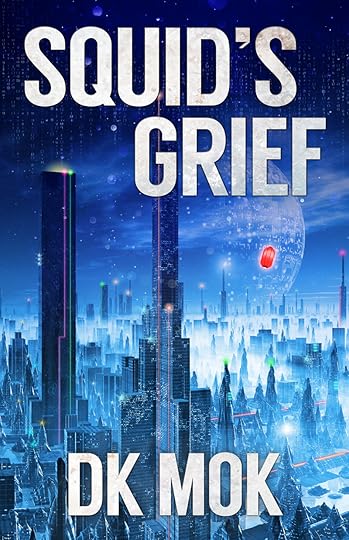
“You don’t belong in a world that sees you as useless.”
While Squid’s Grief begins like many cyberpunk novels, it diverges fairly quickly and ends aligned with a more solarpunk ideological standpoint than a traditional cyberpunk one.
Squid is relatable and likable. Probably the only way she is synonymous with the traditional cyberpunk anti-heroes is that she’s poor. Her poverty is ingrained and felt in the narrative in a way that is often not in traditional CP, though. In fact, for most of the book, we see the car thief attempting to get out of the life, touching on the one-last-job trope, but actually spends substantial time on it; making it the main focus of the story. This cleverly reinforces the systemic oppression those in poverty within the fictitious Baltus City feel on a daily basis. It’s more relatable passages of ones concerning job searches and the parallel to service work. Demeaning. Dehumanizing, unsatisfying. Only making a living via tips in establishments that have a prized rule: “do not retaliate”. Which certainly telegraphs what your treatment is going to be like in such places.
“Baltus City was a nation unto itself, a city-state where extremes were crammed into uncomfortable proximity. The obscenely wealthy, the devastatingly poor, towering skyscrapers and sleepy suburbia, all pressed together beneath the massive orbital highways that laced the city like Celtic knots of steel and concrete. And within the borders of the teeming state, all were equally ruled by the enigmatic crime lords of Baltus City.”
To flog this normal life along, a hyper altruistic cop named Casey gives Squid until her 18th birthday to get out of the life. After that, her “free passes”, so to speak, are up, and she’s considered to be another person who enters the system. Casey is incorruptible and naïve. Some people just aren’t prosecuted in the city, she knows this. It’s an insurmountable fact. Those connected to an omnipresence named Pearce, simply walk. But while the system is not perfect, it’s also all they’ve got. Giving up would mean letting go of any sense of accountability for criminals. And she just can’t abide it at a fundamental level.
People mess up. They’re not infallible. But given enough time and care, people can change and do “the right thing”. And that is her hope for young Squid.
“History isn’t destiny if you learn from your mistakes.”
In the last few days Squid has before she’s absorbed completely into the criminal underworld, Grief comes into her life. A man with a mysterious past (even to himself!). He’s an amnesiac who is found in the trunk of a car with a head injury. He’s also the thing that unwittingly keeps pulling her back to the underworld, as his past continually seems to come back and haunt him. Squid being caught in the crossfire.
Now, to my knowledge, aside from perhaps Almost Human, the “buddy cop” genre hasn’t largely been introduced to cyberpunk literature. That is, until now.
Squid and Grief’s relationship dynamic is very much reminiscent of this. It’s often funny and easy, and a lot of the fiction is dedicated to building their characterization through small, quiet moments as they navigate a new, awkward, and strange life. It is very effective in having the reader invest in these characters.
“Memories were funny like that. Squid could remember her old life, but she remembered it like someone else’s dream. It played through her mind like a silent film, so distant she could almost believe it had never happened. But once in a while, a half-remembered emotion would hit her, so visceral it stole her breath away.”
The most compelling part for me was that the thing keeping the people like Squid down was the system itself, which by itself, is not abnormal for cyberpunk, but the way in which it is conveyed is entirely so. It’s essentially a slice of life for the entire middle half of the book.
There aren’t any jobs for Squid that don’t commodify the qualities she finds intrinsic in herself and refuses to trade, despite her pretty dire situation. Living without heat and power, relying on the kindness of people within the system, like Casey, to squeak by with some modicum of freedom. Both outside of jail, but also simply existing as she is, unchanged by the demands of working the way up in the underworld, or a more legitimate job; both strips away aspects of her identity. In a sense, it’s a coming of age story, of sorts. There is no safety to be found in any space she navigates.
“There were no quick fixes, no magic pills, no waking up and becoming someone else. But there was hope, and determination, and sometimes, a little faith from someone who could see the person you were trying to become.”
Paralleling this is Grief’s story. A loss of innocence tale unspooling and foreshadowing what the demands of the criminal underworld are as it becomes clear Grief belongs to it in ways Squid hasn’t. Where she dabbles for the thrill and to pay rent, Grief embodies the darker elements of it and wishes to expel them from him. But cannot do so without first acknowledging that they are a part of him, which he refuses to do. This darkness reveals Casey’s “free pass” is an almost immeasurable kindness toward Squid, who may otherwise be consumed by the underworld if she can’t figure out how to truly get out.
“Possessions, places, people—they came and went, grew old, fell apart, and changed. But experiences formed the fabric of your life, woven into memories that helped you understand who you were, and why you were. Memories were a gift you could hold on to when everything else had been taken away. They were a scrapbook of emotions, triumphs and setbacks, that line of ink that told your story, stopping at the point where you stood right now.”
The law serves a purpose in this fiction and there is morality assigned to it. There are tonal shifts very often, which for me undermined some of the systemic issues it explores. There is a sense of hope despite the cyberpunk underpinnings of the setting.
In a time when cyberpunk should be diverging from the original motifs and explorations, there is this fun and well written, strange book which does so in the most surprising ways. Ordinarily, I can’t stand jokes and fiction that is to self-aware. But while it is funny, it is also sad. Life is a joke when there’s no real verticality in social structures to be had by the majority of the people in it. Living without joy is just another thing taken away from you. And so, sometimes, it really can be thematically on point to laugh at it.
Find Squid’s Grief on Amazon here. D.K Mok’s Twitter here, and her blog here.
“All those things he’d done were still inside him. All that violence and inhumanity, soaking through him like cheap rum in a Christmas cake. It wasn’t enough to change. You had to make amends.”
Squid's Grief Weaves In The Buddy Cop & A Slice Of Life To Cyberpunk

“You don’t belong in a world that sees you as useless.”
While Squid’s Grief begins like many cyberpunk novels, it diverges fairly quickly and ends aligned with a more solarpunk ideological standpoint than a traditional cyberpunk one.
Squid is relatable and likable. Probably the only way she is synonymous with the traditional cyberpunk anti-heroes is that she’s poor. Her poverty is ingrained and felt in the narrative in a way that is often not in traditional CP, though. In fact, for most of the book, we see the car thief attempting to get out of the life, touching on the one-last-job trope, but actually spends substantial time on it; making it the main focus of the story. This cleverly reinforces the systemic oppression those in poverty within the fictitious Baltus City feel on a daily basis. It’s more relatable passages of ones concerning job searches and the parallel to service work. Demeaning. Dehumanizing, unsatisfying. Only making a living via tips in establishments that have a prized rule: “do not retaliate”. Which certainly telegraphs what your treatment is going to be like in such places.
“Baltus City was a nation unto itself, a city-state where extremes were crammed into uncomfortable proximity. The obscenely wealthy, the devastatingly poor, towering skyscrapers and sleepy suburbia, all pressed together beneath the massive orbital highways that laced the city like Celtic knots of steel and concrete. And within the borders of the teeming state, all were equally ruled by the enigmatic crime lords of Baltus City.”
To flog this normal life along, a hyper altruistic cop named Casey gives Squid until her 18th birthday to get out of the life. After that, her “free passes”, so to speak, are up, and she’s considered to be another person who enters the system. Casey is incorruptible and naïve. Some people just aren’t prosecuted in the city, she knows this. It’s an insurmountable fact. Those connected to an omnipresence named Pearce, simply walk. But while the system is not perfect, it’s also all they’ve got. Giving up would mean letting go of any sense of accountability for criminals. And she just can’t abide it at a fundamental level.
People mess up. They’re not infallible. But given enough time and care, people can change and do “the right thing”. And that is her hope for young Squid.
“History isn’t destiny if you learn from your mistakes.”
In the last few days Squid has before she’s absorbed completely into the criminal underworld, Grief comes into her life. A man with a mysterious past (even to himself!). He’s an amnesiac who is found in the trunk of a car with a head injury. He’s also the thing that unwittingly keeps pulling her back to the underworld, as his past continually seems to come back and haunt him. Squid being caught in the crossfire.
Now, to my knowledge, aside from perhaps Almost Human, the “buddy cop” genre hasn’t largely been introduced to cyberpunk literature. That is, until now.
Squid and Grief’s relationship dynamic is very much reminiscent of this. It’s often funny and easy, and a lot of the fiction is dedicated to building their characterization through small, quiet moments as they navigate a new, awkward, and strange life. It is very effective in having the reader invest in these characters.
“Memories were funny like that. Squid could remember her old life, but she remembered it like someone else’s dream. It played through her mind like a silent film, so distant she could almost believe it had never happened. But once in a while, a half-remembered emotion would hit her, so visceral it stole her breath away.”
The most compelling part for me was that the thing keeping the people like Squid down was the system itself, which by itself, is not abnormal for cyberpunk, but the way in which it is conveyed is entirely so. It’s essentially a slice of life for the entire middle half of the book.
There aren’t any jobs for Squid that don’t commodify the qualities she finds intrinsic in herself and refuses to trade, despite her pretty dire situation. Living without heat and power, relying on the kindness of people within the system, like Casey, to squeak by with some modicum of freedom. Both outside of jail, but also simply existing as she is, unchanged by the demands of working the way up in the underworld, or a more legitimate job; both strips away aspects of her identity. In a sense, it’s a coming of age story, of sorts. There is no safety to be found in any space she navigates.
“There were no quick fixes, no magic pills, no waking up and becoming someone else. But there was hope, and determination, and sometimes, a little faith from someone who could see the person you were trying to become.”
Paralleling this is Grief’s story. A loss of innocence tale unspooling and foreshadowing what the demands of the criminal underworld are as it becomes clear Grief belongs to it in ways Squid hasn’t. Where she dabbles for the thrill and to pay rent, Grief embodies the darker elements of it and wishes to expel them from him. But cannot do so without first acknowledging that they are a part of him, which he refuses to do. This darkness reveals Casey’s “free pass” is an almost immeasurable kindness toward Squid, who may otherwise be consumed by the underworld if she can’t figure out how to truly get out.
“Possessions, places, people—they came and went, grew old, fell apart, and changed. But experiences formed the fabric of your life, woven into memories that helped you understand who you were, and why you were. Memories were a gift you could hold on to when everything else had been taken away. They were a scrapbook of emotions, triumphs and setbacks, that line of ink that told your story, stopping at the point where you stood right now.”
The law serves a purpose in this fiction and there is morality assigned to it. There are tonal shifts very often, which for me undermined some of the systemic issues it explores. There is a sense of hope despite the cyberpunk underpinnings of the setting.
In a time when cyberpunk should be diverging from the original motifs and explorations, there is this fun and well written, strange book which does so in the most surprising ways. Ordinarily, I can’t stand jokes and fiction that is to self-aware. But while it is funny, it is also sad. Life is a joke when there’s no real verticality in social structures to be had by the majority of the people in it. Living without joy is just another thing taken away from you. And so, sometimes, it really can be thematically on point to laugh at it.
Find Squid’s Grief on Amazon here. D.K Mok’s Twitter here, and her blog here.
“All those things he’d done were still inside him. All that violence and inhumanity, soaking through him like cheap rum in a Christmas cake. It wasn’t enough to change. You had to make amends.”



